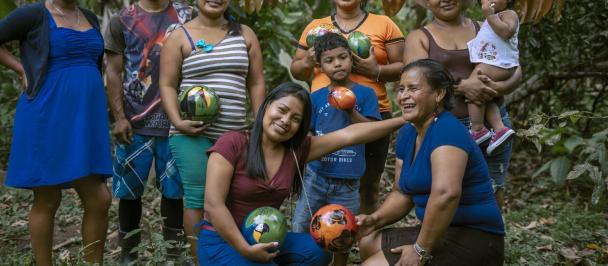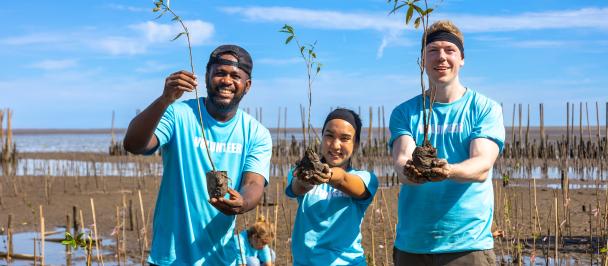One thing was clear at this year’s World Economic Forum; nature is at the top of the agenda. The stage had been set last year by the Intergovernmental Panel on Biodiversity and Ecosystems report, with the startling claim that as many as one million species face extinction by 2050. Biodiversity loss not only starred as the number three spot in the world’s most severe threats in the annual Global Economic Risks Report, it also played a supporting role in other global risks, including food and water crises, environmental disasters, interstate conflict and involuntary migration. A new report released in Davos, Nature Risk Rising, estimates that more than half our global economy—US$44 trillion—directly depends on nature, and hence is vulnerable to environmental shocks.
What emerged from these reports was not that biodiversity is in steep decline; the searing images of the Australian fires that killed more than a billion creatures already provided ample evidence of this trend. Rather, the reports made plain what more than 1,330 municipal and national governments had already determined--that biodiversity loss, coupled with climate change, poses a profound, existential planetary emergency, including for the world’s cities and economies.
We have just ten years to achieve the Sustainable Development Goals, and the United Nations, UNDP, and the Club of Rome are calling for a ‘Decade of Action’. This month, the largest ever World Urban Forum will focus on key challenges for a Decade of Action for a global urban agenda. Taking bold steps in the coming decade is imperative; taking bold decisions this year – the Super Year for Nature - is even more so, especially for cities. What happens in rural places around the world has a direct bearing on all cities, all communities. The five most essential decisions for 2020 include:
- Government offices: Governments must reposition nature at the heart of sustainable development. This means re-evaluating the impact of the agricultural subsidies, national infrastructure plans, global infrastructure plans, foreign debt policies, and development policies that encourage biodiversity loss. It also means placing ecosystem restoration and protection at the forefront of national climate, food, water, security and rural and urban development plans.
- Corporate board rooms: Corporations must decide once and for all to eliminate deforestation from their supply chains, especially in beef, soy, palm oil, rubber and timber. Despite hundreds of corporate commitments to achieve the 2020 deadline of the New York Declaration on Forests and SDG 15.2 to end deforestation, not a single one of 500 leading companies has been able to achieve that goal. Moreover, 70 percent of the world’s largest companies fail to disclose their impacts on forests. This must end; since 2015, we have lost an area of tropical forest the size of Belgium and we are on the verge of dangerous and irreversible tipping points.
- Financial institutions: Decisions to finance the loss of biodiversity, whether intentional or not, are made by managers of pension funds, sovereign wealth funds, monetary financial institutions, banks and investment houses worldwide. There are more than US$258 trillion in assets under management; less than one percent would entirely finance the SDGs, and a fraction of a percent--a rounding error-- would finance nature fully. Yet investments continue to drive biodiversity loss instead of recovery. Just as we are beginning to build transparency in the impact of investments on climate, we must now decide to do the same for nature.
- Judicial courts: Environmental defenders and journalists at the front line of biodiversity loss are facing unprecedented intimidation, assault and murder. Judicial courts must resolve to defend the defenders, and to bring to justice crimes which are largely perpetrated by mining, agribusiness and logging companies, and abetted by local corruption. They must also uphold laws regarding illegal poaching, especially those perpetrated by crime syndicates, as well as for large-scale pollution and dumping, especially those driven by corporate negligence.
- UN convention halls: At United Nations meetings this year, governments will set targets in a 10-year strategic plan for biodiversity at the Convention on Biological Diversity, set fair rules on carbon markets for the Paris Agreement at the global climate conference of the UN Framework Convention on Climate Change, decide whether global ocean governance matters at a UN Ocean Conference, and decide whether biodiversity truly is a global heads-of-state issue at the first-ever UN Biodiversity Summit. These decisions are the prelude to bold global action in the coming decade, and they must be made with global resolve and high ambition, commensurate with the scale or our planetary emergency.
These decisions are not easy. They require bold, audacious new ideas, such as the Decade of Ecological Civilization and the Decade on Ecosystem Restoration. They require new technology, including and tracking supply chains. They require new legal frameworks for the rights of indigenous peoples and for nature itself. They require new ways of valuing ecosystems, and new instruments for financing nature’s regeneration instead of nature’s loss. They require new ways of thinking about equitable and just transitions, such as Europe’s Green New Deal.
Despite the diversity of decisions involved, they all boil down to just one: are we going to decide that this is the decade that we weave a planetary safety net for all life on earth, or are we not? The upcoming World Urban Forum is a great place to affirm that the answer is yes!

 Locations
Locations




